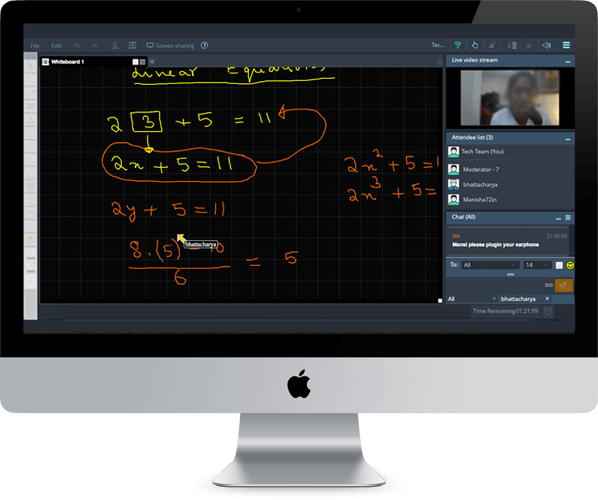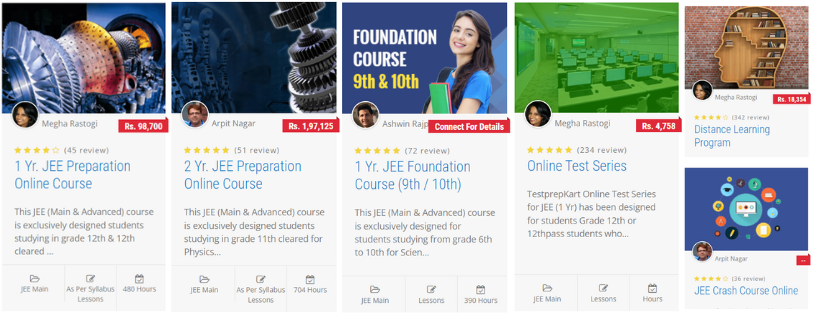How to Prepare for JEE Main in 6 Months?
Preparing for JEE Main in 6 months demands a focused and efficient approach. Start by thoroughly understanding the syllabus and organizing a well-structured study plan, allotting adequate time for each subject. Concentrate on strengthening your fundamental concepts and consistently practice problem-solving across varying levels of difficulty.
Get JEE Prep Help Download NRI JEE E-BOOK
How to Prepare for JEE Main in 6 Months? - Strategy, Study Plan
Many students wonder how to get ready for the JEE Main in just six months, especially when they also have to study for their board exams. It can be tough to balance both. But there's a way! You can follow a smart six-month study plan by TestprepKart for JEE Main and get closer to getting into a top college.
This article has all the advice you need to prepare for JEE Main in just 6 months. It covers making a study schedule, deciding what topics to focus on, the best study techniques, and more.
Feeling stressed about exams? Not a worry if you understand the strategies!
Step 1: Familiarize yourself with the JEE exam pattern.
Step 2: Consider topics and subjects as crucial elements in your preparation.
Step 3: Select your study materials wisely; books can be your closest companions.
Step 4: The quality of your plan significantly impacts your chances of success.
Step 5: Effectively manage your time to ensure your preparation goes smoothly.
Step 6: Dedicate yourself to consistent practice, and victory will become yours.
Step 7: Balance Work and Play for a Brighter Day.
Step 8: Online Preparation Courses.
1. Familiarize yourself with the JEE exam pattern
To effectively get ready for the JEE Main in just half a year, it's crucial to be familiar with the exam's structure. Questions will primarily cover topics from class 11 and 12. Expect a total of 90 questions centered on Physics, Chemistry, and Mathematics (PCM). Remember, there's a negative marking, so avoid making random guesses. Grasping the JEE Main's format and curriculum will guide you in strategizing which sections to tackle first and how to approach questions that may seem challenging.
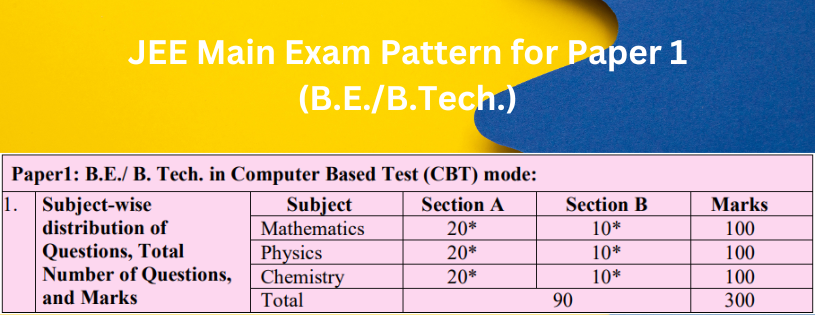
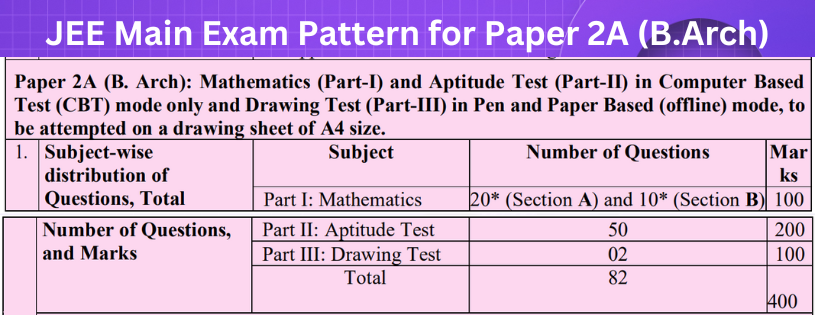
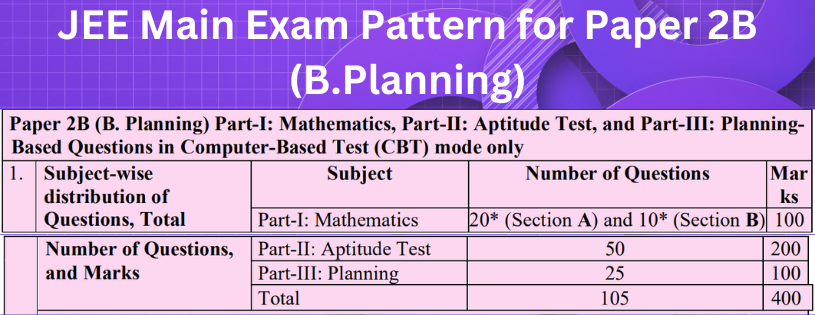
2. Consider topics and subjects as crucial elements in your preparation
The JEE Main syllabus closely aligns with what you've been learning in your 11th and 12th-grade classes, which is an advantage as you've already covered these topics in school and during your self-study sessions. Before diving into your preparation, take some time to thoroughly review the JEE Main syllabus. This step will help you identify the areas where you may need extra attention and the subjects where you already shine. Concentrate your efforts on strengthening your weaker areas while continuing to build on your strong foundation. Below table has some important JEE Main topics to watch out for
| Physics Topics with Weightage | Chemistry Topics with Weightage | Mathematics Topics with Weightage |
| Physics and Measurement (4%) Properties of Solids and Liquids (5%) Thermodynamics (9%) Electrostatics (9%) Current Electricity (8%) Magnetic Effects of Current and Magnetism (5%) Electromagnetic Waves (5%) Optics (10%) Dual Nature of Matter and Radiation (6%) Electronic devices (14%) Communication Systems (5%) |
Some basic concepts in Chemistry (5%) Solutions (5%) Chemical Thermodynamics (4%) Equilibrium (6%) Redox Reaction and Electrochemistry (4%) p- Block Elements (5%) Chemical Bonding and Molecular Structure (5%) d - and f - BLOCK ELEMENTS (4%) Coordination Compounds (4%) Organic Compounds containing Halogens (2%) Organic Compounds containing Oxygen (6%) Chemistry in Everyday Life (4%) |
Sets, Relations and Functions (5%) Complex numbers and quadratic equations (7%) Matrices and Determinants (7%) Permutations and combinations (4%) Sequence and series (5%) Integral Calculus (9%) Limit , continuity and differentiability (10%) Coordinate geometry (15%) Three Dimensional Geometry (6%) Vector Algebra (5%) Statistics and Probability (8%) Trigonometry (4%) |
3. Select your study materials wisely; books can be your closest companions
NCERT textbooks are excellent for building your foundational knowledge, you can enhance your understanding by exploring additional resources. The choice of reference materials is crucial in this regard. It's advisable to steer clear of books that use complex language and opt instead for straightforward textbooks or study materials that offer clear explanations and solutions. When preparing for the JEE Main exam with a 6 month timeframe, consider referring to the following recommended books:
4. The quality of your plan significantly impacts your chances of success
Achieving success is closely tied to effective planning. When it comes to preparing for the JEE Main in just six months, it's no simple task. You need a well-structured study plan to ensure your success. But how do you create one? Let's break down the entire time frame into two distinct stages:
Stage 1 (First 4 Months): During this phase, your primary focus will be on thoroughly studying the chapters and actively engaging with the material. This means diving into the content, practicing questions, and working through numerical problems to build a strong foundation.
Stage 2 (Final Two Months): Just take some time to review all that you've learned.
5. Effectively manage your time to ensure your preparation goes smoothly
When aiming for the JEE Main exam in just half a year, time becomes a crucial factor. How you organize your time and approach your studies can greatly influence your chances of success in cracking the JEE Main within this tight timeframe. The initial step in this journey is to create a well-structured timetable and commit to following it diligently.
To ensure a productive JEE Main study timetable, follow these essential steps:
1. Allocate Time Wisely: Divide your study sessions into three crucial phases: studying, practicing, and revising. This method ensures a comprehensive understanding of the material.
| Study Time | Target |
| 6:00 AM - 6:30 AM | Get Up, freshen up, exercise/take a walk. |
| 6:30 AM - 7:00 AM | Take a break of 30 minutes, and have some refreshment. |
| 7:00 AM - 9:00 AM | Study Chemistry. |
| 9:01 AM - 9:15 AM | Breakfast. |
| 9:16 AM - 10:00 AM | Revise Chemistry. |
| 10:01 AM - 12:00 PM | Study Physics. |
| 12:01 PM - 12: 15 PM | Take a break. |
| 12:16 PM - 1:00 PM | Revise Physics. |
| 1:00 PM - 2:30 PM | Lunch/ a short nap. |
| 2:31 PM - 4:30 PM | Practise Mathematics. |
| 4:30 PM - 4:45 PM | Take a break of 15 minutes. |
| 4:46 PM - 5:30 PM | Revise Mathematics. |
| 5:30 PM - 6:00 PM | Take a tea break or go out for a walk. |
| 6:01 PM - 9:00 PM | Practise from the previous year’s question papers. |
| 9:01 PM - 10:00 PM | Make notes of all the important topics studied during the day. |
| 10:01 PM - 11:00 PM | Have your dinner and spend time with your family. |
| 11:01 PM | Go to sleep. |
2. Daily Planning: While long-term planning is great, it's okay if you can't do it. Focus on organizing your daily routine.
6 Months JEE Main Time Table for Physics:
| No. of days | Chapter |
| 5 | Physical World & Measurement |
| 5 | Kinematics |
| 5 | Laws of motion |
| 5 | Work, energy, and power |
| 10 | Rotational Motion |
| 5 | Gravitation |
| 8 | Properties of Solids and Liquids |
| 5 | Kinetic Theory of Gases |
| 13 | Thermodynamics |
| 8 | Oscillations and Waves |
| 14 | Electrostatics |
| 13 | Current Electricity |
| 13 | Magnetic Effects of Current and Magnetism |
| 10 | Electromagnetic Induction and Alternating Currents |
| 5 | Electromagnetic Waves |
| 13 | Optics |
| 5 | Dual Nature of Matter and Radiation |
| 5 | Atoms And Nuclei |
| 8 | Electronic devices |
| 5 | Communication Systems |
| 5 | Experimental Skills |
6 Months JEE Main Time Table for Chemistry:
| No. of days | Chapter |
| 8 | Some Basic concepts of Chemistry |
| 5 | Atomic Structure |
| 7 | Classification of elements and periodic table |
| 5 | Chemical Bonding and molecular structure |
| 3 | States of Matter |
| 7 | Chemical Thermodynamics |
| 5 | Equilibrium |
| 6 | Redox Reactions and Electrochemistry |
| 10 | Solutions |
| 8 | Chemical Kinetics |
| 5 | Surface Chemistry |
| 7 | General Principles and processes of Isolation Elements |
| 5 | Hydrogen |
| 5 | s- Block Elements ( Alkali and Alkaline earth metals ) |
| 6 | p-Block elements |
| 5 | d and f Block Elements |
| 14 | Coordination compounds: |
| 6 | Some Basic principles and techniques |
| 7 | Hydrocarbons |
| 5 | Organic Compounds Containing Halogens |
| 11 | Organic Compounds Containing Oxygen |
| 7 | Organic Compounds Containing Nitrogen |
| 3 | Biomolecules |
| 3 | Polymers |
| 7 | Environmental Chemistry |
| 2 | Chemistry in Everyday Life |
| 1 | Purifiction and Characterization of Organic Compounds |
| 2 | Principles related to Practical Chemistry |
6 Months JEE Main Time Table for Mathematics:
| No. of Days | Chapter |
| 7 | Sets, Relations, and Functions |
| 13 | Complex numbers and Quadratic Equations |
| 8 | Matrices and Determinants |
| 10 | Sequences and Series |
| 10 | Trigonometry |
| 23 | Coordinate Geometry |
| 20 | Limit, Continuity and Differentiability |
| 15 | Integral Calculus |
| 6 | Differential Equations |
| 7 | Vector Algebra |
| 13 | Three Dimensional Geometry |
| 5 | Permutations and Combinations |
| 7 | Binomial Theory and its Simple Applications |
| 13 | Statistics and Probability |
| 1 | Mathematical Induction |
| 7 | Mathematical Reasoning |
3. Study-Practice-Revise: After completing a chapter, engage in active practice with relevant questions. Don't forget to revise what you've learned. This reinforces your understanding and retention.
4. Plan Ahead: Before bedtime, set your goals for the next day. Having a clear direction helps you start your day on the right track.
5. Prioritize Sleep: Your schedule should incorporate 6-7 hours of sleep. Quality rest rejuvenates your mind and improves your overall performance.
6. Include Leisure Time: Don't forget to allocate some time for leisure and relaxation. It's essential to give your brain a break to maintain focus and motivation.
6. Dedicate yourself to consistent practice, and victory will become yours
Every year, JEE Main attracts over 12 lakh students who participate in this massive examination. Given its vast scope, it's important to note that the questions posed in the exam cover a wide range of topics. To gain a deeper insight into the types of questions and the specific subjects covered, it is highly recommended to practice with previous years' JEE Main question papers. By doing so, you not only familiarize yourself with the varying difficulty levels but also gain valuable insights on how to effectively prepare for JEE Main within a six-month timeframe.
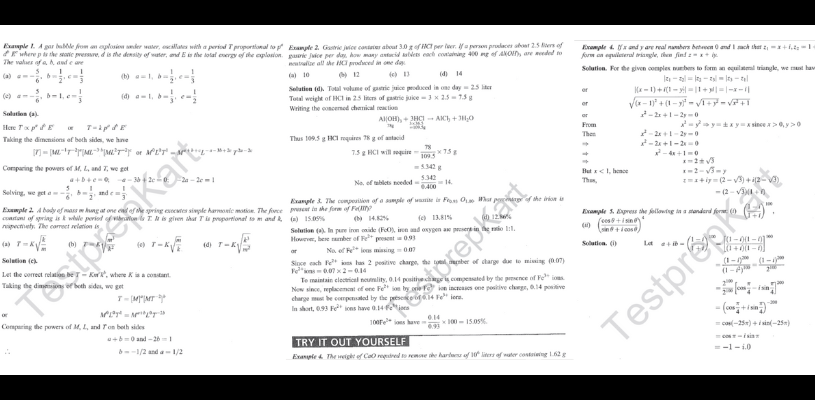
Download JEE Previous Year Paper PDF
7. Balance Work and Play for a Brighter Day
Studying is important, but so is staying healthy and motivated. To achieve this, you need to take care of yourself. Make sure to eat nutritious meals, get enough sleep, and focus on your studies. Worrying won't make things better or help you prepare effectively.
8. Online Preparation Courses
Numerous students who are getting ready for the JEE Main examination often browse different websites that provide online resources and study materials. If you are one of these students preparing for the JEE exam, Testprepkart is the perfect choice for your top-tier preparation. Specifically tailored for NRI students looking for high-quality classes, Testprepkart stands out as the leading option with its specialized offerings.
Download NRI JEE Prep eBook

FAQs On How To Prepare For JEE Main in 6 Months?
Q1. Can I effectively prepare for JEE Main in just 6 months?
Ans. Yes, with a focused and structured study plan, consistent effort, and smart preparation strategies, you can make significant progress in your JEE Main preparation within 6 months.
Q2. How should I start my preparation?
Ans. Start by understanding the JEE Main syllabus, assessing your strengths and weaknesses, and creating a detailed study plan that allocates time for each subject, revision, and mock tests.
Q3. What is the importance of a study plan?
Ans. A study plan helps you organize your preparation, cover all topics, and ensure balanced progress across subjects. It also aids in time management and prevents last-minute cramming.
Q4. How should I balance revision and new topics?
Ans. Dedicate a portion of your study time to revision and the rest to new topics. Regularly revisiting previously covered topics reinforces your understanding while allowing you to progress.
Q5. What should my approach be towards mock tests?
Ans. Mock tests are crucial for assessing your progress and refining your exam-taking skills. Treat them as practice for the actual exam, simulate exam conditions, and analyze your performance afterward.
Q6. Should I only focus on solving problems?
Ans. While problem-solving is important, ensure you have a strong conceptual understanding of topics. Balance problem-solving with revisiting theory, especially for weaker areas.
Q7. Can I cover the entire syllabus in 6 months?
Ans. While covering the entire syllabus is ideal, prioritize topics based on their weightage and your comfort level. Focus on mastering high-weightage topics and ensuring a basic understanding of others.
Q8. What role do online resources play in my preparation?
Ans. Online platforms offer mock tests, practice questions, and video lectures that can supplement your preparation. They help you adapt to the computer-based exam format.
Q9. How do I manage stress during these intense months?
Ans. Practice regular exercise, maintain a balanced diet, and ensure sufficient sleep. Incorporate relaxation techniques like meditation or hobbies to alleviate stress.
